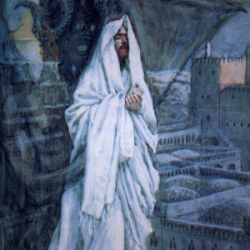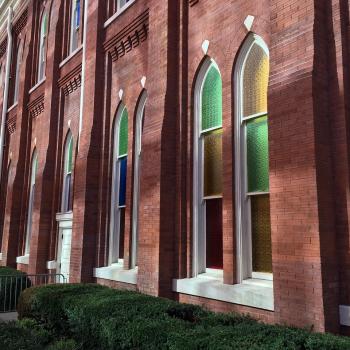Editors' Note: This article is part of the Patheos Public Square on the Future of Faith in America: Catholicism. Read other perspectives here.
Dire predictions about the future of Catholicism in the United States are presently (and perhaps always have been) omnipresent. Can the Church sustain a public presence in the world with a declining national demographic, especially among millennials? Will the nation-state impinge upon the religious freedom of those practicing Catholicism? Is the Church at a point in which she must disengage from public life and nurture among herself the faithful remnant?
As a theologian influenced by Augustine, I tend to read cultural signs very realistically. I am worried about declining Mass attendance, as well as the drop in sacramental marriage and infant baptism. I see Catholic universities and colleges too often willing to give up their particularity for the sake of empty words like excellence and prestige. I wonder about the undergraduate students with whom I work whose account of human flourishing are devoid of an integral Catholic vision. In other words, I worry.
But, in the end, I cannot maintain my sourpuss disposition about the future of Catholicism in the United States. Though sociology can report upon the dire state of present Catholic practice, it cannot predict the future of the millennial Church just now coming into positions of leadership in Church and society alike. At Notre Dame, I encounter every semester undergraduate and graduate students who have chosen the Catholic Option. These students have immersed themselves in the theological tradition of the Church. They upset traditional categories of liberal and progressive by singing Latin polyphony on the weekends, spending summers in Calcutta serving the poor, and taking courses where they learn to critique forms of conspicuous consumption. They write plays about the perils of eating disorders, organize conferences around the effects of pornography, and feel deeply uncomfortable belonging to either the Democratic or Republic party.
They eschew a form of clericalism in which ordination bestows every human gift possible; yet, they love priests, seeing them as signs of an alternative way of happiness in the world, of radical self-gift. They are frustrated and even angered by approaches to catechesis that did not treat them as thinking Catholics. They are tired of tepid preaching, bad liturgical music, and churches that are modeled off of the latest shopping mall. They read John Paul II, Benedict XVI, and Pope Francis — at the very same time. They are philosophers, scientists, engineers, lawyers, and those who give themselves over to full ecclesial ministry as priest or lay person. They get married and have families, offering their particular talents in the context of parishes throughout the United States. They have encountered a Catholicism that is not reducible to party politics but offers an integral vision of human life.
Yet the problem in today's Church is a reticence to invite these very millennials into positions of leadership. National ministry organizations, as well as the USCCB, continue to bemoan the absence of millennials in the Church only to pass over the remarkable millennials already in the Church. Catholic universities seem at times unwilling to employ these post-ideological millennials as faculty members and staff, changing the tenor of the discussion relative to Catholic identity. Parishes often see these millennial Catholics as passive recipients for the reception of sacramental grace, rather than active disciples, who could be catalysts for parish life — preachers and teachers for the present generation. Rather than study millennials as some foreign entity in our midst, the Church would do well to employ their particular genius for our time.
So, I am cautiously non-pessimistic about the future of Catholicism in the United States, because there seems to be a generation of non-ideological, millennial Catholics just waiting to renew Church and society alike. They are not perfect (and they need formation). They are not some universal salve for the administrative, pastoral, and theological bungles that often take place within the Church. But, they serve as sacramental signs of a form of integral Catholicism, which can move us past old arguments and old wounds toward the renewal of the American Church and, indeed, of the world itself.
7/15/2015 4:00:00 AM




